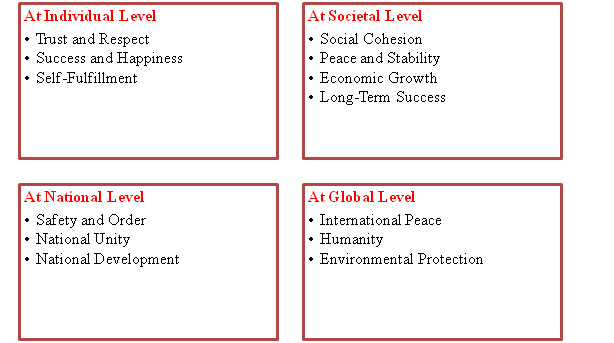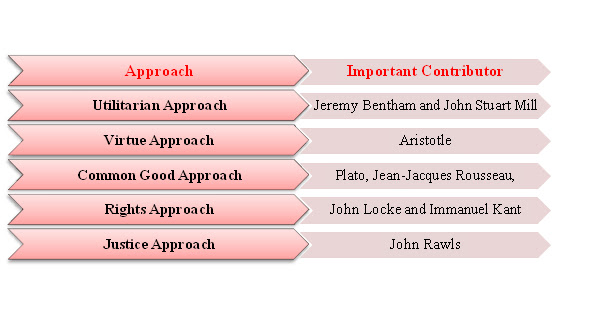The Consequences of Ethics
The Impact of Ethics on
Individuals
Trust and Respect
·
Honesty fosters trust and respect,
while dishonesty can damage reputations and strain relationships.
Success and Happiness
·
Integrity in work and relationships
leads to success and happiness, while dishonesty breeds mistrust and conflict.
Self-Fulfillment
·
Helping those in need contributes to
societal well-being and personal fulfillment, while selfishness can lead to
isolation and dissatisfaction.
The Impact of Ethics on
Societies
Social Cohesion
·
Respecting diverse viewpoints
promotes social cohesion and prevents conflict, while intolerance can lead to
violence and war.
Peace and Stability
·
Treating all individuals fairly
creates a peaceful and stable society, while injustice breeds inequality,
riots, and instability.
Economic Growth
·
High ethical standards within a
society foster trust between businesses and individuals, reducing transaction
costs and encouraging investment and economic growth.
Long-Term Success
·
Organizations that operate ethically
are more likely to gain customer trust and maintain a strong reputation,
leading to long-term success and profitability.
The Impact of Ethics on
Nations
Safety and Order
·
Obeying laws promotes public safety
and order, while lawlessness leads to instability, crime, and threats to
national security.
National Unity
·
Respecting all citizens regardless
of religion, caste, or language strengthens national unity, while ethnic or
religious divisions can harm national cohesion and lead to fragmentation.
National Development
·
Working for the public good and
contributing to national development leads to a progressive and prosperous
nation, while selfishness and corruption can hinder national progress and cause
public discontent.
The Impact of Ethics on
the Global Stage
International Peace
·
Promoting peaceful coexistence and
dialogue between nations contributes to global peace and stability, while war
and violence lead to loss of life, displacement, and global instability.
Humanity
·
Respecting all human beings
regardless of race, religion, or nationality promotes humanity, while racism
and discrimination lead to violence, conflict, and human rights abuses.
Environmental Protection
·
Global cooperation is essential to
protect the environment and ensure a healthy planet for future generations,
while environmental degradation can lead to climate change, natural disasters,
and biodiversity loss.
Ethics serves as a cornerstone for a
just, prosperous, and sustainable world. By embracing ethical principles at the
individual, societal, national, and global levels, we can foster harmonious
coexistence, promote human well-being, and safeguard our planet for generations
to come.
Promoting Ethics in Society: A Comprehensive Approach
Ethics serves as the bedrock of a just, equitable, and thriving society. By fostering ethical principles at all levels, we can cultivate harmonious coexistence, promote human well-being, and safeguard our planet for future generations.
Individual Responsibility
· Ethics begins at the individual level. We can promote ethical conduct by examining our own values and beliefs, and consciously choosing to act with integrity in our daily lives.
· Simple actions, such as refraining from littering in public spaces and repaying debts promptly, contribute to a more ethical society.
The Role of Families
· Parents play a crucial role in instilling strong moral values in their children. Values such as honesty, compassion, respect, and justice can be imparted through example and open communication.
· Children closely observe their parents' behavior, making it essential for parents to embody the lessons they impart.
Cooperation of Educational Institutions
· Schools and universities should educate students about ethical principles, social justice, and responsible citizenship.
· Integrating these topics into the curriculum, coupled with discussions on ethical dilemmas and encouraging students to make sound judgments, can foster ethical reasoning.
The Responsibility of the Media
· Media institutions can enhance public awareness by disseminating truthful reporting and encouraging discussions on ethical issues.
· They can also promote ethical storytelling and highlight positive role models.
Commitment of Governments and Organizations
· Governments and organizations must operate with transparency and accountability.
· This entails adhering to ethical codes of conduct, combating corruption, and proactively addressing ethical concerns.
Ethical Leadership
· Respected individuals in society should courageously take ethical stances. This can inspire others to follow suit and promote a culture of ethical decision-making.
· For instance, a public figure's involvement in a charitable cause can encourage others to engage in social responsibility.
Ethics permeates every aspect of life. To lead fulfilling lives individually and collectively, we must cultivate ethical values and actively promote them within our communities. By embracing the outlined strategies, we can foster a society characterized by integrity, compassion, and social responsibility.
Dimensions of Ethics
Five Key Dimensions of Ethics
Utilitarian approach
This principle evaluates the morality of an action based on its consequences. If an action brings greater happiness or well-being to a majority of people, it is considered morally right.
· Example: Developing a new drug to treat a disease requires testing the drug on animals. According to utilitarianism, this is a right decision. While some animals may suffer, it could save many lives and improve their well-being.
Virtue Approach
This principle evaluates the morality of an action based on an individual's virtues. If a person's actions align with a good character, they are considered morally right.
· Example: A doctor treating patients honestly and with care is an example of the virtue approach.
· Another example: An individual volunteering in their community exemplifies the virtue approach.
Common Good Approach
This principle evaluates the morality of an action based on its impact on the overall well-being of the community. If an action benefits the community as a whole, it is considered morally right.
· Example: Creating laws to protect the environment is an example of the common good approach.
· Another example: Encouraging dialogue between nations to prevent war is another example of the common good approach.
Rights Approach
This principle is based on the idea that every individual has fundamental rights. The morality of an action is determined by whether it respects or violates these rights. Some examples of fundamental rights include the right to life, liberty, and freedom of expression.
· Example: Discharging an employee based on their religion is morally wrong from the rights approach perspective.
Justice Approach
The justice approach encompasses principles like equality, fairness, and respect. Key tenets of this approach include treating equals equally, those who put in more effort deserve more rewards, and those in greater need deserve more.
· Example: Providing equal pay for all employees is an example of the justice approach.
· Another example: The punishment for a crime should be proportionate to the severity of the crime.
Making sound decisions is not always straightforward. There is often debate about which ethical principle applies in different situations. Sometimes, different principles may contradict each other, making it challenging to make a decision. However, understanding ethical principles helps us make moral choices in our lives. By carefully considering these principles, we can lead fulfilling lives and contribute to a better society.
Ethics is a journey. Our destination is
shaped by the choices we make each day. To build a better future, we must all
act ethically and be accountable to one another.






No comments:
Post a Comment